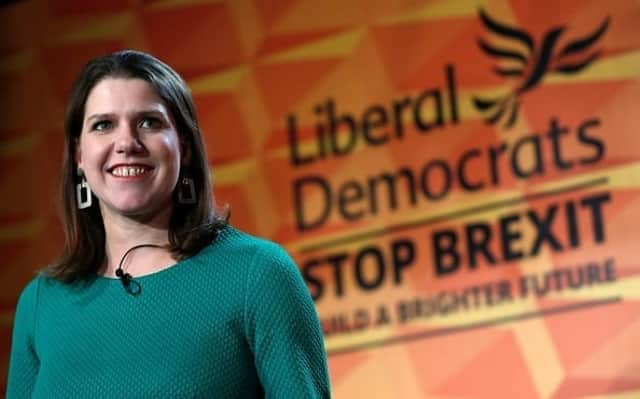Fact-checking the election: fake newspapers and a squirrel hoax


The UK election campaign continues to unleash yet more disinformation – with political parties stepping up to grab the headlines.
First Draft, a global non-profit organisation, is keeping close tabs on disputed content and media manipulation during the general election campaign.
Advertisement
Hide AdAdvertisement
Hide AdInvestigations from their collaborative CrossCheck project – in which newsrooms around the country share tips, emerging narratives and insights – have included a so-called Conservative ‘fact-checking’ service and the continued circulation of a hoax targeting the Liberal Democrat leader Jo Swinson.


A Tory ‘fact-checking’ service, a fresh doctored video and a parody Labour manifesto site
Having already posted a “satirical” doctored video of shadow Brexit secretary Sir Keir Starmer, the Conservative Party was criticised for fresh attempts to mislead voters.
As the campaign stepped up a gear with the first televised debate on November 19, the Conservative Party press office created huge waves by changing the branding of its Twitter account, @CCHQPress, to appear as a fact-checking service.
For the duration of the head-to-head between Prime Minister Boris Johnson and Labour leader Jeremy Corbyn, “factcheckUK” posted a variety of graphics and GIFs criticising Corbyn and praising Johnson.
Advertisement
Hide AdAdvertisement
Hide AdImmediately following the debate, First Draft highlighted some of the other nations, including Mexico and Turkey, in which governments had launched their own fact-checking services to push a party line.
Senior Conservatives defended their actions, claiming it was clear the account was from CCHQ. However, Twitter took a rare stance in accusing the Tories of misleading the public with the stunt, adding that it would take “decisive, corrective” action if it repeated the act.
Following the “factcheckUK” episode, James Temperton, WIRED’s digital editor, wrote: “Counterintuitively, the stunt has allowed a number of Tory MPs to go on TV and radio and push the line that Jeremy Corbyn can’t be trusted.
“Most of the electorate don’t use or care about what happens on Twitter. What last night’s stunt has allowed the Conservative Party to do is get everyone talking about facts and the truth rather than policy.”
Advertisement
Hide AdAdvertisement
Hide AdThen, on the day of the Labour manifesto launch on November 21, the CCHQ Twitter account posted a five-second clip of Labour MP Jess Phillips appearing to say that her party wouldn’t be able to deliver its election pledges.
While the CCHQ version of the video was stamped with that day’s date, it was in fact from an interview on October 3. The MP condemned the clip as “misleading”.
I understand it's difficult for the Conservatives to understand a politician being honest, but this is so misleading, I was being asked why I'd changed my views on Brexit, weeks ago. Labour MP condemns new 'misleading' video shared by official Tory account https://t.co/ZVe0AEl7BC
— Jess Phillips Esq., (@jessphillips) November 21, 2019
During the week the Conservative Party had launched a website mocking Labour’s manifesto, complete with a homepage in the party’s signature shade of red.
Advertisement
Hide AdAdvertisement
Hide AdAn ad for the site, paid for by the Conservative Party, even appeared to be the top result under “labour” for some Google users.
latest tory google ad has slapped in the dubious "£2,400 extra tax for every taxpayer" calculation, which assumes all taxpayers pay the same amount. that is not how our tax system works and it's been debunked by fullfact here https://t.co/sXA6W1gv81 pic.twitter.com/41iD44VlpA
— Niamh McIntyre (@niamh_mcintyre) November 21, 2019
The site came to people’s attention also on November 21.
Jo Swinson forced to deny fake squirrel claims
The Lib Dem leader was asked about a viral hoax concerning squirrels on LBC radio on November 19.
First Draft had been monitoring the hoax since November 2, when it first appeared on Twitter. An account shared a doctored Daily Mirror article, accusing Swinson of cruelty to the animals, which was retweeted nearly 1,000 times by pro-Labour accounts. It was reshared hundreds of times more with many people appearing to believe the claim was true.
Advertisement
Hide AdAdvertisement
Hide AdA Medium post later emerged from a fictitious publication and a non-existent author pushing the same false claims. The author used a stock image of “woman thinking” as a profile picture.
Later, the hoax was given a new lease of life after the Medium post was picked by a Brexit Party account and was shared over 4,000 times on Facebook, according to CrowdTangle data.
First Draft initially decided not to report on this until it had reached a wider audience (in this case, the LBC interview). Often, those producing fake stories aim to get them in the mainstream media – even if it’s in the form of a debunk. First Draft have decided not to link out to disputed content for this reason.
Campaign literature masquerading as newspapers
Also on November 21, First Draft was alerted by CrossCheck partners to election literature from political parties masquerading as newspapers. Voters described the move as “underhand” and “unethical”.
Advertisement
Hide AdAdvertisement
Hide AdIs this ethical? Dressing up lib dem election campaign leaflets as a local newspaper? #Election2019 #LibDem pic.twitter.com/SOWNYz53ci
— Joanne Wardle ☢️ (@joannewardle) November 16, 2019
The ‘fake’ newspapers — including ‘St. Albans and District News’, ‘Hazel Grove Gazette’ and ‘Cheadle Challenger’ — have been reported in at least 13 constituencies in recent days. The Liberal Democrats appear to be promoting the literature in at least 12 of these areas.
Joanne Wardle, a radiographer from Leeds, told First Draft: “I have been a Lib Dem voter for years. We had a brilliant Lib Dem MP (Greg Mulholland). But this has really put me off them. I always thought of them as the most above-board party, but this is subtly underhand.”
A Lib Dem spokesman said: “We stand by keeping local people informed of local issues.”
Advertisement
Hide AdAdvertisement
Hide AdThere was one example of a Labour newspaper in the constituency of Tooting, and one of a Conservative paper in Cheltenham.
Using search strings on Twitter targeting the political parties and their newspapers, First Draft found that several users have called out the newspapers as disinformation campaigns by the parties attempting to disguise their campaign material as legitimate newspapers. First Draft has reached out to Labour and the Conservatives for comment.
Reposted BBC North West clip
Also on November 21 – what might be considered a busy day for disinformation watchers – Labour grassroots organisation Momentum tweeted an interview clip of home secretary, Priti Patel, captioned: “This is the clip the BBC deleted from their page. After ten years in power, Priti Patel doesn’t think the Conservative government is to blame for poverty.” At time of writing, it has been shared over 4,000 times.
BBC North West had deleted the tweet, but reposted it shortly after, explaining that “the text on the original tweet paraphrased the comments in the video. For clarity, we have removed the quotation marks and reposted the video”.
Advertisement
Hide AdAdvertisement
Hide AdMomentum made no reference to the clarification, and the organisation’s post – with the text “BBC deleted this clip” – continues to be shared. The organisation has not responded to requests for comment.
First Draft is a global non-profit that tackles disinformation and media manipulation. CrossCheck is our global network for collaborative reporting and research between newsrooms.